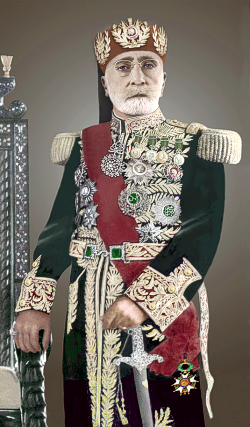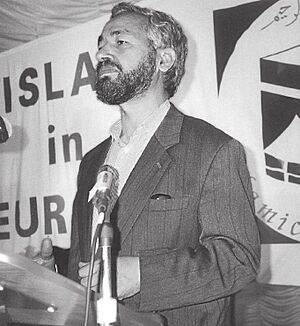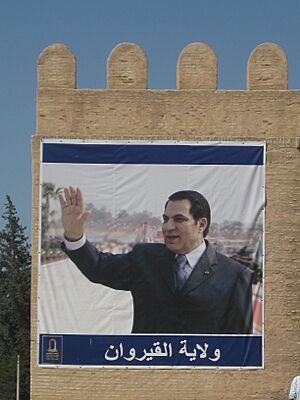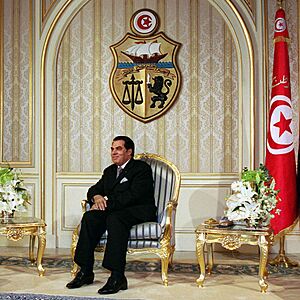History of modern Tunisia facts for kids
Tunisia is a country in North Africa, officially called the Republic of Tunisia. It has over ten million people, mostly of Arab-Berber background. The Mediterranean Sea is to its north and east, Libya to the southeast, and Algeria to the west. Tunis is the capital city, located near the ancient city of Carthage.
Tunisia's first modern leader was President Habib Bourguiba. He had a lot of political experience from leading the independence movement for many years. As the main figure of the Neo-Destour Party, he helped Tunisia gain full independence in 1956. He led the government until 1987. During his time, he brought in new laws, improved the economy, and raised the standard of living for many. He also kept Tunisia independent in its foreign policy, while still trading with Western countries.
Ben Ali became President in 1987. He stayed in power until he was forced to leave in 2011. His economic plans focused on a market-based system. Tunisia's economy grew steadily under his leadership.
After Ben Ali left, a special group called the Constituent Assembly was chosen. They wrote a new constitution. In 2014, new leaders were elected, starting what is known as the Second Republic.
Contents
Becoming an Independent Nation
Tunisia worked for many decades to gain its freedom. This led to the end of the French protectorate, which had started in 1881. In 1954, the struggle for independence and public unrest led to talks between France and the Neo Destour political party. This party was led by Habib Bourguiba and supported by Tunisian workers and the Arab League.
In April 1955, an agreement was made. France would keep control of the army and foreign affairs, but Tunisia would become self-governing the next year. Bourguiba was released from prison and received a huge welcome. This agreement, however, caused a split within the Neo Destour party. Eventually, a more radical leader, Salah ben Youssef, was removed. This showed that the Neo Destour party would follow a moderate path.
France then ended its control over Morocco to focus its efforts on Algeria. Because Tunisians strongly wanted full independence, Bourguiba pushed for it. Despite strong objections from French settlers, France agreed. On March 20, 1956, Tunisia became a fully independent country. In July, Tunisia joined the United Nations.
France had planned for an independent Tunisia to be a monarchy. It would be ruled by the Bey of Tunis, Muhammad VIII al-Amin Bey (Lamine Bey). The Bey was a traditional ruler from the Ottoman era. Elections were held on March 25, 1956. The Neo Destour party won almost all the seats. Their leader, Habib Bourguiba, became prime minister.
On July 25, 1957, the monarchy was ended. Tunisia was declared a Republic. The assembly then made Bourguiba the first president. Tunisia became a one-party state, meaning only one political party was allowed.
The First Republic (1957–2014)
Bourguiba's Time as President
The Neo Destour government aimed to be well-organized and fair, but it was not a democracy. Bourguiba led the country for 31 years. He brought stability and economic growth. He also limited the influence of religious extremism. He gave women more rights than in many other Arab nations. Tunisia's culture became more secular, focusing on modern ideas.
"Bourguibism" meant that Tunisia would not focus on building a large military. Bourguiba believed this would waste money and lead to military involvement in politics. To help the economy, he took over some religious land and institutions. While he promoted a secular state, he was not against religion itself.
Bourguiba's strength came from the Neo Destour Party. It was a strong nationalist group that had the trust of the nation. It had good leaders who created sensible government plans.
Challenges and Changes
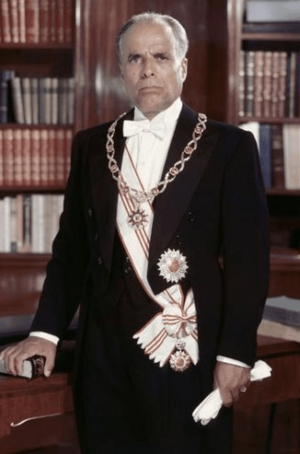
In July 1961, Tunisia blocked the French naval base at Bizerte. They wanted France to leave. This led to a three-day battle where many Tunisians and French soldiers died. France eventually gave the city and naval base to Tunisia in 1963.
Salah Ben Youssef was a serious rival to Bourguiba. He was exiled in Cairo and supported the pan-Arab nationalism of Egyptian leader Gamal Abdul Nasser. Because he strongly opposed the Neo Destour leaders, Ben Youssef was removed from his position and expelled from the party. He gathered many supporters, but eventually left Tunisia. This ended any real opposition to Bourguiba. In 1963, the Neo-Destour Party was declared the only legal party.
Economy Under Bourguiba
At first, socialism was not a main goal for the Neo Destour party. However, the government always had policies to share wealth. A large public works program started in 1961. In 1964, Tunisia briefly entered a socialist period. The Neo Destour party changed its name to the Socialist Destour. A new minister, Ahmed Ben Salah, planned for state-run farms and industries.
This socialist plan faced a lot of opposition. Ahmed Ben Salah was dismissed in 1970. Many state-run operations, like the farm cooperatives, were returned to private ownership in the early 1970s. In 1978, a general strike was put down by the government, and many union leaders were jailed.
After independence, Tunisia's economy focused on light industry, tourism, and phosphate mining. Farming was still important, but small farms did not produce much. In the early 1960s, the economy slowed down. The socialist program did not fix this. In the 1970s, Tunisia's economy grew very well. Oil was discovered, and tourism continued to thrive. Foreign companies invested more. For example, Renault opened a car factory. Many people moved from the countryside to cities. However, farming problems and city unemployment led many Tunisians to seek work in Europe.
Politics in the 1980s
In 1981, the government allowed a few "officially approved" parties to run in elections. But the economy struggled. The I.M.F. required Tunisia to raise bread prices. This led to the Tunisian bread riots in December 1983 – January 1984, where over 100 protesters were killed. The Islamic Tendency Movement (MTI) led by Rashid al-Ghannushi became more prominent. Thousands were jailed, especially Islamists. Newspapers that criticized the government were closed, and trade unions were disbanded. General Ben Ali was in charge of security.
Tunisia kept strong ties with Western countries for trade and politics. The Arab League was located in Tunis from 1979 to 1991. The P.L.O. was also based in Tunis from 1982 to 1994. On October 1, 1985, Israeli planes bombed the PLO's headquarters in Tunis, killing over 60 people.
Political democracy was almost non-existent. The constitution gave the president almost dictatorial powers. Civil liberties were limited by law. The media had to censor themselves, and opponents were often imprisoned. Bourguiba became the center of a personality cult. He was called the "Supreme Warrior" of the nation. In 1975, Bourguiba was declared president for life, even though his health was poor. Although he allowed opposition parties in 1981, Tunisia remained a one-party state. The ruling party won all seats in parliament. Opposition groups were unhappy and boycotted the next elections in 1986.
Ben Ali's Time as President
In the 1980s, the economy did not do well. In 1983, the International Monetary Fund (IMF) made the government raise the price of bread. This caused severe hardship and protests. The Islamic Tendency Movement (MTI) led by Rashid al-Ghannushi became a popular voice. Protests, including those by Islamists, were put down by government security forces led by General Zine El Abidine Ben Ali. The government continued its plans, and Ben Ali was named prime minister.
Becoming President
Ben Ali became President on November 7, 1987. Doctors of the former president, Habib Bourguiba, stated he was too ill to continue his duties. This change in power was sometimes called the "medical coup d'état" or the "Jasmine Revolution". Ben Ali became acting president until elections in 1989. At the time, Tunisia faced high inflation and large foreign debt.
Ben Ali initially took steps to make the government more open. He ended the strong focus on his predecessor's personality. He also changed the constitution to limit the president to three five-year terms. In 1988, some Islamist activists were released from prison. He also worked with the Harakat al-Ittijah al-Islami (Islamic Tendency Movement), which later changed its name to Ennahda. He also changed the ruling party's name to the Democratic Constitutional Rally.
However, Ben Ali's new approach did not last. In the 1989 elections, the official results showed the ruling party won every seat. Many felt the elections were unfair. Ben Ali then banned Islamist political parties and jailed many activists. He ran unopposed in Tunisia's first presidential election since 1972. Opposition candidates found it very difficult to get enough support to run.
The crackdown in 1989 brought back some old restrictions. Self-censorship became official censorship. Ben Ali was reelected unopposed in 1994. After changing the constitution again to allow more terms, Ben Ali was reelected in 1999, 2004, and 2009. Each time, he won by very high percentages. By the early 2000s, Ben Ali was seen as leading one of the most controlling governments in the world.
Economic Changes
As president, Ben Ali supported economic changes that made Tunisia's economy stronger and brought in more foreign investment. After he became president, Tunisia's income per person more than tripled. The economy grew steadily for about 20 years after 1987. A report in 2010 listed Tunisia as one of Africa's "Lions," meaning it was a strong economic performer.
Good trade with the European Union, a growing tourism industry, and steady farming helped the economy grow. Tunisia was ranked first in Africa for global competitiveness in 2010-2011.
However, Tunisia still had high unemployment, especially among young people. Many poor people in rural and urban areas did not benefit from the economic growth. This led to mass protests in December 2010-January 2011. This was the worst unrest the country had seen in over a decade.
International Relations
During Ben Ali's presidency, Tunisia followed a moderate foreign policy. It promoted peaceful ways to solve conflicts. Tunisia helped with peace efforts, especially in the Middle East and Africa. Tunisia hosted the first talks between Palestinians and Americans. It supported the Palestinian cause. Tunisia also called for international efforts against terrorism since the early 1990s. It was a key partner with the US in fighting global terrorism.
President Ben Ali mostly kept his predecessor's pro-Western foreign policy. However, he also improved ties with Arab and Muslim countries. He worked to promote unity and cooperation among nations. He started the United Nations World Solidarity Fund to help end poverty. Ben Ali also played a big role in the UN declaring 2010 as the International Year of Youth.
Losing Power
Starting in December 2010, Tunisians began large protests against unemployment and corruption. As protests grew, Ben Ali declared a state of emergency. He dissolved the government on January 14, 2011, and promised new elections. Later that day, Prime Minister Mohammed Ghannouchi announced that the President had left the country. Ben Ali fled Tunisia on January 14, going to Saudi Arabia. These protests became known as the Tunisian Revolution.
The Revolution of 2011
The protests in late 2010 and early 2011 led to the overthrow of President Ben Ali. This event is known as the Tunisian Revolution. It marked a major turning point in Tunisia's history, leading to a period of political change and the start of a new democratic process.
The Second Republic (2014–present)
After the revolution, Tunisia worked to build a new democratic system. In the November–December 2014 presidential election, Beji Caid Essebsi won. He became president on December 31, 2014.
Tunisia's first democratically elected president, Beji Caid Essebsi, passed away in July 2019. After him, Kais Saied became Tunisia's president. He won by a large margin in the 2019 Tunisian presidential election in October 2019. He was known for being honest. On October 23, 2019, Kais Saied was sworn in as president. In July 2022, Tunisians approved a new constitution in a referendum. This new constitution gave more powers to the president, strengthening the role of President Kais Saied significantly.
See also
- History of medieval Tunisia
- Hafsid
- History of Ottoman era Tunisia
- Barbary Coast
- List of Beys of Tunis
- Tunisian Italians
- French conquest of Tunisia
- Tunisian Campaign
- Tunisia
- History of Tunisia
- History of Africa
 | Emma Amos |
 | Edward Mitchell Bannister |
 | Larry D. Alexander |
 | Ernie Barnes |


